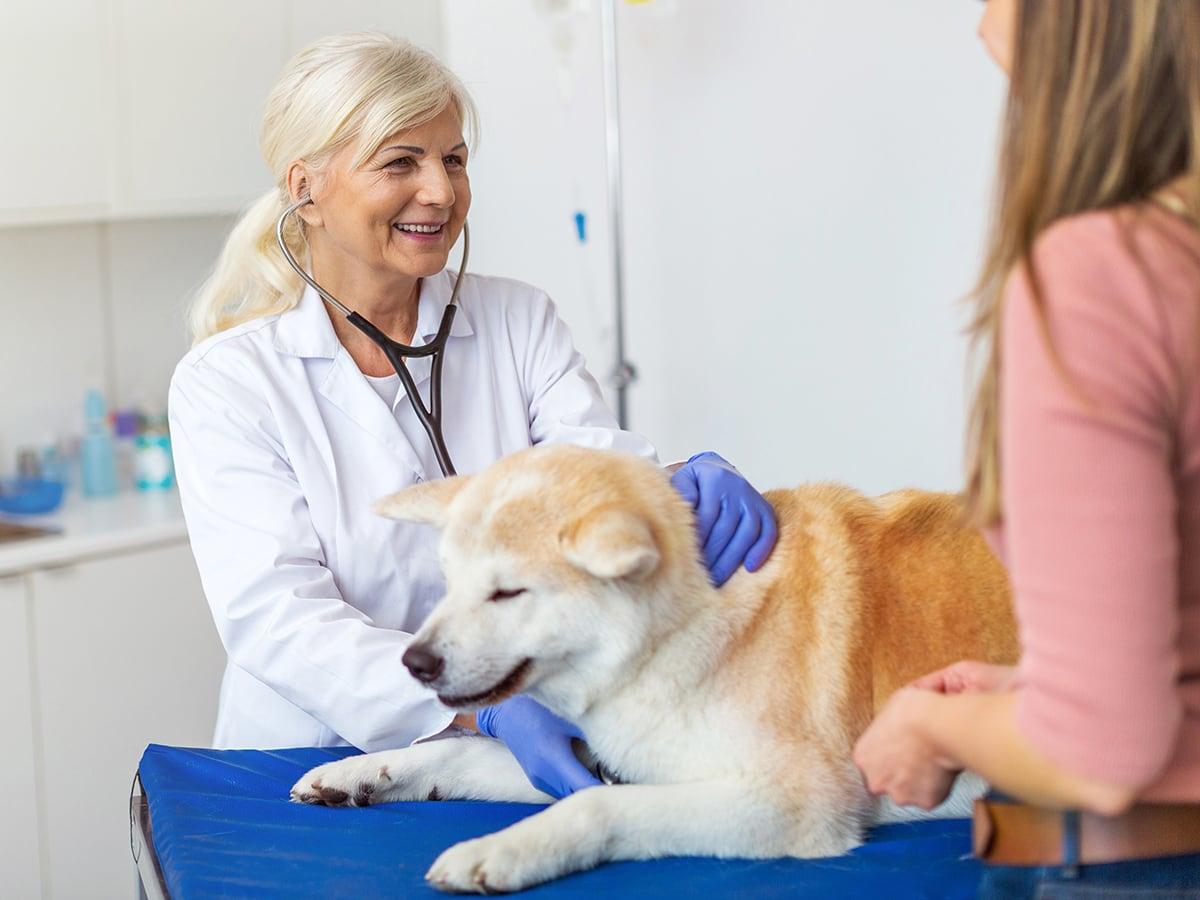Almost 80% of Canadian households have some type of pet. And over half of Canadian households have a dog, a cat, or both.2 According to Made in Canada, Canadians spent 9 billion on their pets in 2019 alone!3 Between 2018 and 2021, Canadians’ spending on pets increased by 17.1%.3 But where are these pet parents spending all the money?
A survey found that on average dog parents spent $1,200 on food alone, and another $743 on dental cleanings.4 They spent another $247 on parasite prevention, $183 on exams and vaccinations, and $151 on blood work.4 These expenses don’t consider the cost of annual diagnostic tests, for example heartworm and fecal tests, or the cost of toys, treats, and other dog supplies like collars or grooming supplies. Other optional costs like dog walkers, dog sitters, or boarding are also not included in these averages.
One expense that most of the pet parents shared was vet bills. According to a report by the Ontario Veterinary Medical Association (OVMA), pet parents spend an approximate $2,000 on vet bills for the first year with a puppy, and an approximate $1,489 the year after.5
Vet bills form the majority of expenses for most of the dog parents. Let us understand the break-up of vet bills and how you can try to plan for them better.
How Much Do Vet Bills Cost for a Dog?
You’ll likely have to take your dog to a vet for various reasons. These can include –
Routine checkup – For overall wellness and treating any ongoing conditions
Vaccinations – As per the recommended schedule
Unexpected Medical condition – If you see any symptoms like vomiting, diarrhea, lethargy, excessive drooling, etc.
Emergencies – If your pup gets into a fight, or accident, eats something it’s not supposed to, or has a seizure, etc.
Special visits – For procedures like spaying or neutering, foreign object removal, dental extraction, ongoing therapy like aqua therapy, etc.
Your vet bill will typically depend on why you’re taking your dog to the vet. Your location, type of facility, and dog breed may also be other factors affecting your vet bill.
Here are the average vet bills for each of the above scenarios –
Routine check-up - $25 - $1862
Vaccination - $20 - $60 per dose6
Emergencies - $150 - $250 for the initial exam, and $1,600 - $10,000 if your pet’s treatment involves surgery7
Medical conditions - $100 - $5006 (for ear infections, allergies, diarrhea, UTIs, diabetes, and more)
Special Visits - $160 - $220 for spaying/neutering6, $700 for treatment of dental disease6
How Much are Dog Vet Bills?
As mentioned above, the average vet bill for your dog could be in the range of $500 - $1500 per year depending on a variety of factors. If we assume that your dog may not need any additional services like surgery or therapies, here are the expected vet expenses that could occur.
Routine vet visit - ≈$1006 (Adult dogs should have a complete veterinary examination at least once a year. Puppies need veterinary visits usually every 3 to 4 weeks until they are about 4 months old)
Vaccinations - ≈$250 annually for the core vaccines like Bordetella, Influenza, Rabies, DHPP, etc.9
Preventive measures - ≈$40 per month for procedures like flea and tick prevention, and heartworm prevention.6
Spaying / Neutering - ≈$200 one-time cost6
Microchipping - ≈$45 one-time cost8
These are typically going to be your vet expenses given your dog doesn’t need any additional medication for unexpected illnesses or injuries. If it does, your vet bills can even go in 4 digits as the bills won’t stop at the visit. A complete treatment for your dog’s medical condition may require medication, prescription diets, follow-up visits, etc. You can get up to 90% cash back on your eligible vet bills with pet health insurance. More about it below.
Breeds prone to higher vet bills
Some medical conditions are more likely to affect some breeds than others due to their genetics.6 Some examples are –
German Shepherds – They are prone to hip dysplasia, elbow dysplasia, and multiple forms of heart disease including tricuspid valve disease and hypertrophic cardiomyopathy. These medical conditions are usually expensive to treat.
Great Danes – These gentle giants are prone to bloating and heart issues like dilated cardiomyopathy.
Golden Retrievers – One of the most popular, friendly and affectionate dogs are prone to hip dysplasia, elbow dysplasia, and heart diseases.
While these are only some examples, many dog breeds may be prone to one or the other medical conditions that can affect them anytime in their lifespan. Big breeds are generally prone to bone problems while small breeds may be more prone to gastric and respiratory problems. Pet insurance can help here! Details are below.
How can pet insurance help?
Having pet health insurance can help you get up to 90% cash back on eligible vet bills* ranging from accidental injuries to complicated surgeries. Some providers also offer preventive add-ons that can help cover eligible costs of routine vet services like heartworm prevention, flea and tick prevention, vaccinations, and microchip implantation. At Spot Pet Insurance, our Wellness Riders can be added to any accident and illness plan for an extra cost!
Our plans can help pet parents manage the eligible costs of covered veterinary care and help ensure that their pets can receive the best treatment possible. Here are some ways that Spot pet insurance plans can help:
Covers Unexpected Veterinary Costs:
Spot pet insurance plans can cover the eligible costs of unexpected veterinary treatments, such as emergency surgeries, X-rays, and prescription medications for covered conditions.
4 Tiers of Coverage:
Choose from an accident-only or accident and illness plan, and select the coverage limit that best fits the needs of your pet and your budget.
Peace of Mind:
With Spot pet insurance plans, pet parents have help knowing that they can provide the best care for their pet with less worry about the cost.
Our preventive care add-ons can help cover the eligible cost of spaying and neutering, dental cleaning, vaccinations, and other routine care services for your dog, for an additional cost.
Take your step towards better financial planning for your four-legged buddy today.
Get a quote today!
*Reimbursement is based on your pet’s age at enrollment and renewal.

I've had the privilege of immersing myself in the realm of pet safety. As the owner of an energetic mini golden doodle, I know just how stressful being a pet owner can be. I am dedicated to ensuring our beloved pets enjoy a life brimming with good health.
“Getting a cat or dog? Here’s how much pet ownership costs in Canada,” Global News, https://globalnews.ca/news/10369996/pet-ownership-costs-canada/, Mar. 19, 2024.
“Pet Ownership Statistics in Canada,” Made in CA, https://madeinca.ca/pet-ownership-statistics-canada/, June 11, 2024.
“Pet Spending Statistics in Canada,” Made in CA, https://madeinca.ca/pet-spending-canada-statistics/, June 11, 2024.
“Annual cost of caring for a dog in Canada in 2022, by expense type,” Statista, https://www.statista.com/statistics/448188/annual-cost-of-caring-for-a-dog-by-type-canada/, Jan. 12, 2024
“How To Budget For a Family Pet in Canada,” Mydoh, https://www.mydoh.ca/learn/blog/lifestyle/how-to-budget-for-a-family-pet-in-canada/, May 17, 2023.
“Vet bills have soared in Canada. Is pet insurance worth the cost?,” Global News, https://petlifeca.ca/breeds-profiles/health-issues-conditions-in-specific-dog-breeds/












